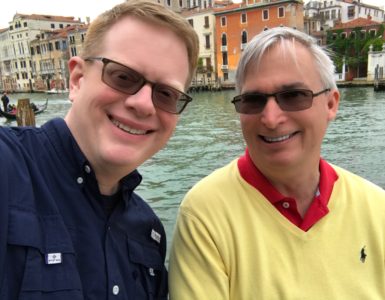Clyde gets up at 6:00 to help his mother fry chicken. The kitchen fills with thin, gray smoke. The liquid fat crackles and spatters. The mound of chicken on the kitchen table grows higher: legs, thighs, breasts, and strips of white meat “for the kids.”
Around ten, Clyde, Dixie, and I climb in the VUE to make the yearly pilgrimage to Darden Lake. We drive through New Albany, pass the Wal-Mart distribution center, and head for open country. Twenty minutes later, we turn onto a rutted gravel trail through dusty pines draped with kudzu.
The lakehouse looks the way it always does: a pseudo-Japanese flower bed here, a maple there, coolers lined up outside the kitchen door. When a place looks the same for decades, small changes fuel much talk. This year, the addition of a second ceiling fan for the porch (“Johnny and Maxine were just going to throw it away!”) and the new coat of paint for the dessert table (“Purple! Why’d you paint it purple? Why not green?”) spark hours of chat and debate.
We wait for lunch. The teenagers fidget. The women fuss. Clyde carries platter after platter to the buffet table. Mama Erin arrives, silver-haired and armed with her aluminum cane. Britt — Parks and Peyton’s father — leads a prayer about freedom and people who fought and died.
We eat too much. We resign ourselves to it; it’s unavoidable. I pile the chicken (salty, yet succulent) on my red plastic plate, along with squash casserole and spinach pie and cracker-topped onion bake and chocolate cake and dipped strawberries. I go back for more chicken and squash. Two hours later, I cruise by for another chicken finger. Peyton brings me a chocolate strawberry; I eat it without a second thought.
We take a boat ride around the lake. Clyde drives. Dixie runs excitedly from one end of the tiny boat to the other, panting with excitement and snapping at our wake. Peyton draps himself over the bow, arms stretched forward, pretending he’s flying over the choppy surface. His mother swigs sweet tea from a bright plastic cup.
Parks, the sixteen-year-old, challenges me to a staring contest. And another. And another. He changes the rules repeatedly. “Okay, this time, you can’t even laugh.” (He loses.) “Okay, this time, you can’t say anything to me to make me laugh.” (He loses.) “Okay, this time, you can’t make faces, all you can do is stare.” (He loses).
Eventually, after the skiing and the card games and the naps, we drive around the lake to Butch’s cabin. Butch, ironically named, given his squeaky voice and sense of humor rooted in squealing and prancing, hauls out a platter of ribs, mounds of chips, and a pyramid made of Texas toast. We can barely manage to drag ourselves to the table, where we eat yet again.
After dark, every family on the lake shoots fireworks from their piers. As is our tradition, we follow the path of stepping stones out to Butch’s spider-webbed boathouse, where we add our own pyrotechnics to the community. We do well; this year, as opposed to last year, all of the mortars shoot up into the air instead of streaking off into the line of spectators. We crane our necks upward, shading our eyes, watching blossoms of red, green, blue, and white burst just above our heads. Debris rains down. People cover their heads and laugh.
On the drive back to Clyde’s parents’ house, we are silent with exhaustion. The satellite radio, still tuned to the bluegrass station Peyton chose the day before, plays a song filled with longing for going back to the hills where the singer was born. Dixie shifts in her bed, sighing.
In bed, Clyde sleeps as soon as his head hits the pillows. I lie awake a few minutes longer, watching the pink heat lightning flickering in the windows.
I think of my own family. Outside of standing in our backyard to watch the fireworks over nearby Jaycee Park, we had no Fourth of July traditions. For us, holidays were a time to shut others out. Led by Mother’s insistence that holidays were “for family only,” the four of us stood — together, but isolated — watching shells burst against a darkened sky.


Add comment